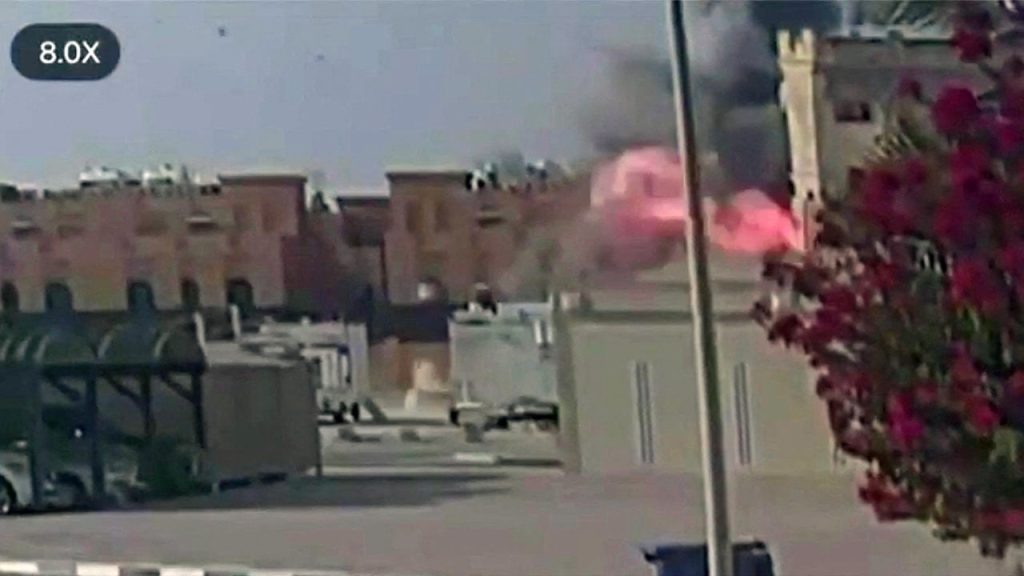Israel Strikes Hamas Leadership in Qatar: Escalating Regional Tensions
In a bold and controversial move, Israel launched precision airstrikes targeting senior Hamas leadership in Qatar on Tuesday, sending shockwaves through diplomatic circles and raising concerns about regional stability. The Israel Defense Forces (IDF) confirmed they conducted “a precise strike targeting the senior leadership of the Hamas terrorist organization” in Doha, specifically Khalil al-Hayya and Zaher Jabarin. Both men have been key figures in recent ceasefire negotiations, with al-Hayya directly involved in talks regarding hostage releases and Jabarin serving as Hamas’ financial overseer. The timing of this strike has raised eyebrows internationally, as it occurred during active peace negotiations in which Qatar has been serving as a crucial mediator between Israel and Hamas following the October 7 attacks. Israeli officials noted they informed the United States before conducting the operation, though the strike still prompted immediate international backlash.
Qatar’s response was swift and forceful, condemning what they described as a “cowardly Israeli attack” that constituted “a flagrant violation of all international laws and norms.” The Qatari Foreign Ministry emphasized that the strike targeted a residential area and posed “a serious threat to the security and safety of Qataris and residents.” In a letter to the Trump administration and the U.S. Embassy in Doha, Qatar specifically highlighted the problematic timing, noting that “Hamas negotiators traveled to Doha for this purpose, meeting yesterday with Qatar’s Prime Minister. Today’s attack clearly was designed to undermine the peace negotiations in which the United States and Qatar are collaborating closely.” The situation was serious enough that the U.S. Embassy in Qatar briefly issued a “shelter-in-place order” for American citizens in the area, underlining the immediate security concerns triggered by the strike.
Israel’s justification for the operation remained unwavering, with the IDF stating that the targeted Hamas members “have led the terrorist organization’s operations, are directly responsible for the brutal October 7 massacre, and have been orchestrating and managing the war against the State of Israel.” Israeli Prime Minister Benjamin Netanyahu personally claimed full responsibility, emphasizing that “Today’s action against the top terrorist chieftains of Hamas was a wholly independent Israeli operation. Israel initiated it, Israel conducted it, and Israel takes full responsibility.” Israeli Ambassador to the United Nations Danny Danon further supported the operation on social media, commending Israel’s security forces and stating, “There is no hiding place for terrorists, and we will continue to pursue them everywhere.” The IDF also insisted that “measures were taken in order to mitigate harm to civilians, including the use of precise munitions and additional intelligence.”
The international diplomatic fallout was immediate and severe, creating new tensions in an already volatile region. Saudi Arabia’s Foreign Ministry “condemns and denounces, in the strongest possible terms, the brutal Israeli aggression and the blatant violation of the sovereignty of the State of Qatar.” European leaders joined in the condemnation, with French President Emmanuel Macron calling the airstrikes “unacceptable, whatever the reason,” and British Prime Minister Keir Starmer stating that he condemned “Israel’s strikes on Doha, which violate Qatar’s sovereignty and risk further escalation across the region.” The response highlights growing international concern that Israel’s tactics may be undermining regional stability and the fragile peace process that multiple nations have been working to facilitate.
The strike in Qatar represents a significant escalation in Israel’s campaign against Hamas leadership, extending the conflict well beyond Gaza’s borders. Targeting senior Hamas officials who were actively participating in internationally-brokered peace negotiations in a third country has complicated diplomatic efforts and raised questions about Israel’s commitment to the negotiation process. For Qatar, which has positioned itself as a key mediator in Middle Eastern conflicts, the violation of its sovereignty presents a particularly challenging diplomatic situation. The country hosts both a significant American military presence as a Major non-NATO ally and has maintained communication channels with various political actors in the region, including Hamas’ political leadership.
As the dust settles on this extraordinary operation, the implications for regional peace efforts remain uncertain. The targeting of Hamas officials during active ceasefire talks may seriously damage the trust necessary for future negotiations. For families of hostages still held by Hamas, this development creates new anxieties about the prospects for their loved ones’ release. Meanwhile, Israel’s willingness to conduct such operations in sovereign nations traditionally considered safe havens for political negotiations signals a potentially dramatic shift in the rules of engagement across the Middle East. Whether this strike will ultimately pressure Hamas toward concessions or further entrench positions and escalate violence remains to be seen, but it undoubtedly marks a significant moment in the ongoing conflict that continues to reshape power dynamics throughout the region.















